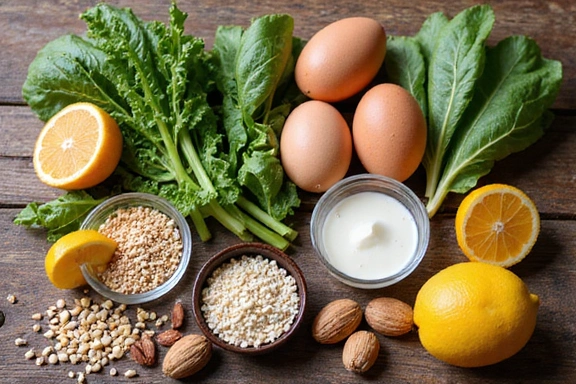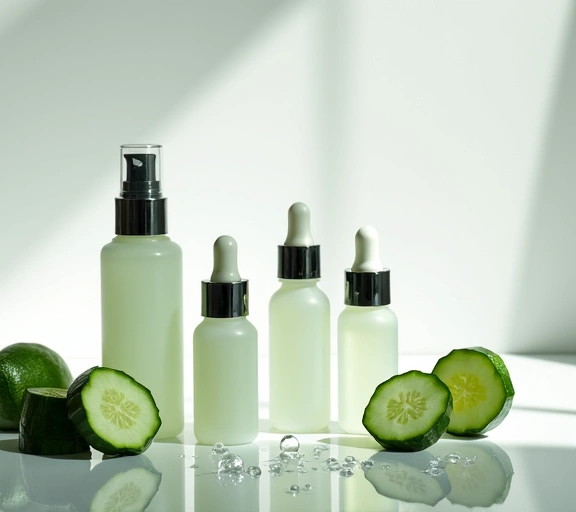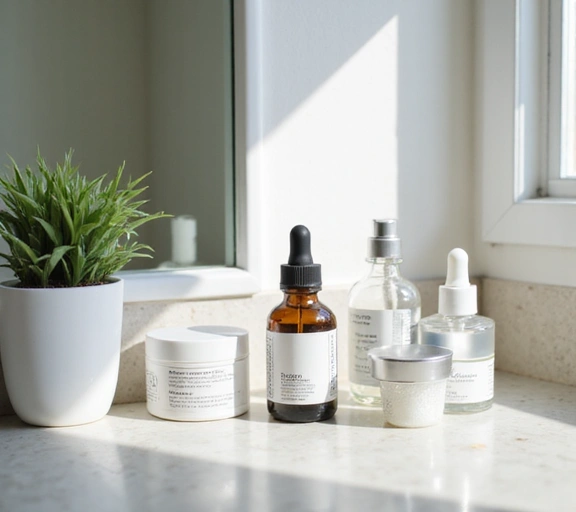Wellness & Skincare Blog
Discover expert insights, tips, and science-backed articles on skincare, wellness, and healthy living to help you look and feel your best.
No articles found matching your criteria. Try adjusting your filters.
Featured Article

Benefits of Natural Vitamins for Daily Energy
In today's fast-paced world, maintaining optimal energy levels is crucial for productivity and overall well-being. Natural vitamins play a vital role in supporting your body's energy production processes. Unlike synthetic alternatives, natural vitamins derived from whole food sources provide bioavailable nutrients that your body can efficiently absorb and utilize.
Understanding Energy Production at the Cellular Level
Your body's cells generate energy through a complex process called cellular respiration. B vitamins, particularly B1 (thiamine), B2 (riboflavin), B3 (niacin), B5 (pantothenic acid), and B12 (cobalamin), are essential cofactors in this process. These vitamins help convert carbohydrates, fats, and proteins into adenosine triphosphate (ATP), the energy currency of your cells. When you're deficient in these nutrients, your energy production suffers, leading to fatigue and reduced performance.

Key B Vitamins for Energy
-
✓
Vitamin B1 (Thiamine):
Converts glucose into energy and supports nervous system function.
-
✓
Vitamin B2 (Riboflavin):
Essential for the electron transport chain in cellular respiration.
-
✓
Vitamin B3 (Niacin):
Critical for NAD production, which is vital for energy metabolism.
-
✓
Vitamin B12 (Cobalamin):
Supports red blood cell formation and oxygen transport throughout the body.
Iron and Oxygen Transport
Iron is another crucial mineral for energy production. It's a key component of hemoglobin, which carries oxygen from your lungs to your cells. Without adequate iron, your cells cannot efficiently produce energy, leading to persistent fatigue. Women of reproductive age, vegetarians, and vegans are particularly at risk for iron deficiency. Natural sources of iron include red meat, poultry, fish, legumes, and dark leafy greens.
Antioxidants and Energy Efficiency
Vitamins C and E, along with minerals like selenium and zinc, function as antioxidants that protect your cells from oxidative damage. This is particularly important during energy production, as the process generates free radicals. By protecting your mitochondria (the powerhouses of your cells) from oxidative stress, antioxidants help maintain efficient energy production. Citrus fruits, berries, nuts, and seeds are excellent natural sources of these protective nutrients.
Pro Tip:
For maximum energy benefits, consume a variety of whole foods including colorful fruits and vegetables, whole grains, lean proteins, and healthy fats. This diverse approach ensures you receive a full spectrum of vitamins and minerals needed for optimal energy production.
Natural Food Sources vs. Supplements
While vitamin supplements can be helpful in addressing specific deficiencies, natural food sources offer several advantages. Whole foods contain vitamins in their naturally occurring forms, often accompanied by other beneficial compounds like fiber, phytonutrients, and co-factors that enhance absorption and utilization. Additionally, food-based vitamins are less likely to cause toxicity issues, as your body can better regulate absorption from natural sources.
Daily Energy-Boosting Foods
Breakfast Ideas
- • Oatmeal with berries and nuts
- • Eggs with whole grain toast
- • Greek yogurt with seeds
- • Green smoothie with spinach
Snack Options
- • Almonds and dried fruit
- • Apple with almond butter
- • Mixed seeds trail mix
- • Hummus with vegetables
Lunch & Dinner
- • Grilled salmon with quinoa
- • Lean beef with sweet potato
- • Legume-based curry
- • Chicken with brown rice
Timing Your Nutrition for Sustained Energy
Beyond which vitamins you consume, when you consume them matters significantly. Eating balanced meals with protein, complex carbohydrates, and healthy fats every 3-4 hours helps maintain stable blood sugar levels and consistent energy throughout the day. Avoid skipping meals, as this can lead to energy crashes and overeating later. Start your day with a nutrient-dense breakfast within an hour of waking to kickstart your metabolism and establish steady energy levels.

Hydration and Energy Levels
While not technically a vitamin, proper hydration is essential for energy production. Even mild dehydration can impair cognitive function and reduce physical performance. Your body requires water to transport nutrients, regulate body temperature, and facilitate all metabolic processes. Aim to drink at least 8-10 glasses of water daily, adjusting for activity level and climate. Herbal teas and water-rich foods like cucumbers, watermelon, and leafy greens also contribute to your daily hydration.
Key Takeaway:
Natural vitamins from whole foods provide your body with the essential nutrients needed for efficient energy production. By incorporating a variety of nutrient-dense foods into your daily diet, maintaining proper hydration, and eating at regular intervals, you can sustain consistent energy levels throughout the day and improve your overall wellness.
Author: Dr. Sarah Mitchell, Nutritionist & Wellness Expert
Published: March 15, 2024 | Category: Nutrition | Reading Time: 12 minutes
Skincare Essentials
Hyaluronic Acid: The Hydration Game-Changer
Hyaluronic acid (HA) has become a cornerstone ingredient in modern skincare routines, and for good reason. This naturally occurring molecule can hold up to 1000 times its weight in water, making it an exceptionally powerful humectant. Unlike many skincare trends that fade, hyaluronic acid has proven its efficacy through decades of scientific research and continues to be recommended by dermatologists worldwide.
Your skin naturally produces hyaluronic acid, but production decreases with age, sun exposure, and environmental stress. By the time you reach 50, your skin may have lost up to 50% of its natural HA. This is why incorporating HA into your skincare routine becomes increasingly important as you age.
Benefits of Hyaluronic Acid:
- → Deep Hydration: Penetrates multiple skin layers to provide intense moisture
- → Plumps Fine Lines: Hydrated skin appears fuller and smoother
- → Improves Elasticity: Supports skin firmness and resilience
- → Reduces Redness: Calms irritation and supports barrier function
- → Suitable for All Skin Types: Including sensitive and acne-prone skin


Morning Skincare Routine for Glowing Skin
Establishing a consistent morning skincare routine is one of the most impactful investments you can make for your skin's health and appearance. Your skin regenerates overnight, making morning the perfect time to prep it for the day ahead and provide protection against environmental stressors.
The 5-Step Morning Routine:
Step 1: Gentle Cleanser
Start with a pH-balanced cleanser to remove overnight oils and impurities. Use lukewarm water and pat dry gently.
Step 2: Toner or Essence
Apply a hydrating toner to balance pH and prepare skin for subsequent products. Pat gently with fingertips.
Step 3: Targeted Serum
Use a serum addressing your specific concerns (vitamin C for brightness, hyaluronic acid for hydration, niacinamide for pores).
Step 4: Moisturizer
Apply a lightweight moisturizer suitable for your skin type to lock in hydration and create a protective barrier.
Step 5: Sunscreen (SPF 30+)
Never skip sunscreen. It's the most important anti-aging product and protects against UV damage and skin cancer.
Stress Management and Skin Health Connection
The mind-skin connection is more powerful than many people realize. Chronic stress triggers a cascade of physiological responses that directly impact your skin's health and appearance. When you experience stress, your body releases cortisol and adrenaline, hormones that prepare you for fight-or-flight responses. While beneficial in acute situations, prolonged stress keeps these hormones elevated, leading to significant skin issues.
Research has consistently shown that stress exacerbates skin conditions including acne, eczema, psoriasis, and rosacea. Stress also accelerates skin aging by promoting inflammation and reducing the skin's ability to repair itself. Understanding this connection empowers you to address skin issues not just topically, but holistically through stress management.
How Stress Damages Skin:
-
●
Increased Cortisol Production:
Elevates oil production, leading to acne breakouts and congestion
-
●
Inflammation:
Activates inflammatory pathways, worsening conditions like rosacea and eczema